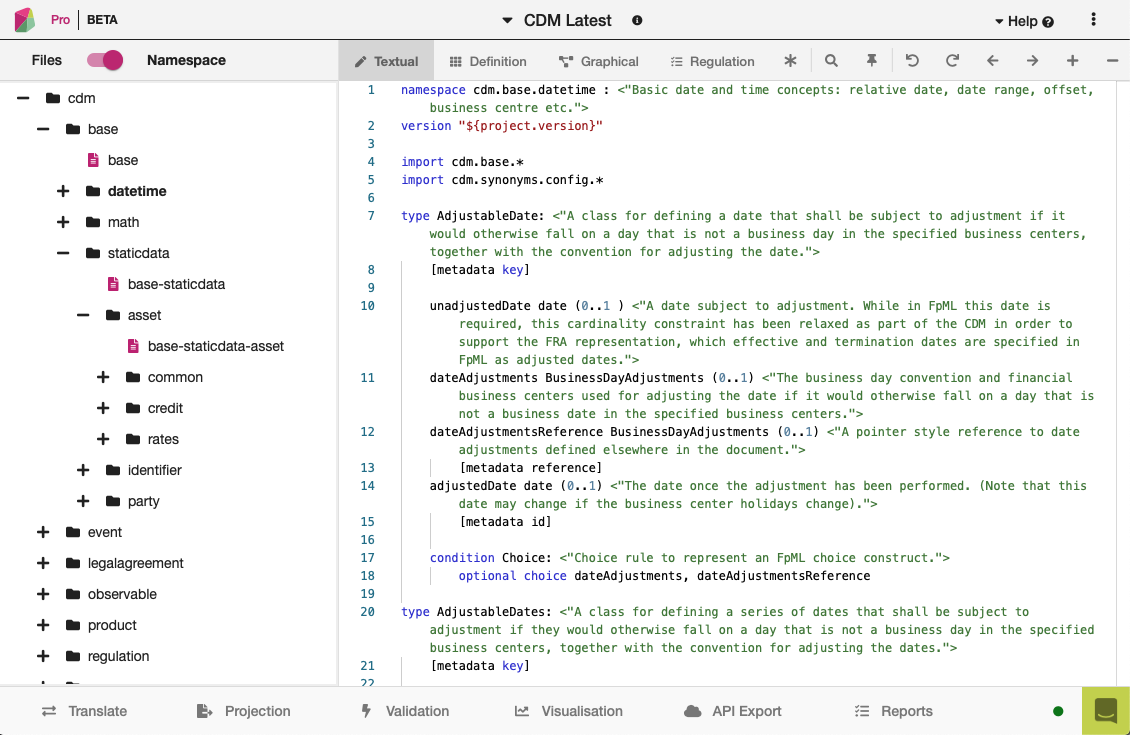The CDM is partitioned into groups of namespaces. A namespace is an abstract container created to hold a logical grouping of model artefacts. The approach is designed to make it easier for users to understand the model structure and adopt selected components. It also aids the development cycle by insulating groups of components from unrelated model changes that may occur. The partitioning is visible to users in Rosetta Core by toggling the Namespace view in the left hand panel, and in the generated code files.
Namespaces have many benefits:
- Accelerated understanding of the model by allowing users to easily see a high-level view of the model and easily find, select, and study specific areas of interest
- Faster and easier to find data types and functions for referencing/use in new components
- Allowing for partial adoption of areas of interest in the model
- Smaller upgrades representing new versions limited to the name spaces that are impacted
Model Artifacts
Model artifacts are organised into a directory hierarchy that is exposed in the model editor.
Organising Principles
Namespaces are organised into a hierarchy, with layers going from in to out. The hierarchy contains an intrinsic inheritance structure where each layer has access to ("imports") the layer outside, and is designed to be usable without any of its inner layers. Layers can contain several namespaces ("siblings"), which can also refer to each other.
Example -- the base namespace

In the example above the layers of the "base" namespace can be observed. There are four layers to the namespace. The outer layer "base" contains one file and three namespaces. The next layer contains three siblings, "datetime", "math", and "staticdata". A third and fourth layer is contained within the "staticdata" namespace.
Hierarchy Structure
The namespace hierarchy in the CDM contains 7 components
- Base -- contains basic concepts used across the model: date, time, maths, static data
- Event -- contains business event concepts: primitive, contract state, and associated state transition function specifications
- Legal Agreement -- contains generic documentation concepts: legal agreement, contract, and credit support specifications
- Observable -- contains observable concepts: market data, holiday calendars, asset class specific specifications
- Product -- contains generic product concepts: quantity, price, economic terms and payout, that are built using template features
- Regulation -- contains regulation concepts: regulatory bodies, corpus, report definitions and field rules
- Synonym -- contains model to model synonym mappings
Each of these higher-level namespaces is further divided into lower-level namespaces. The independent components in each namespace are organised according to their core purpose but can be referenced from anywhere in the model to allow all the components to work together for a complete modelling solution. E.g. below is the product namespace:

When developing new CDM components, the positioning of those components in the namespace hierarchy is critical as part of the design (or potentially the re-organising of the hierarchy following the new development), to ensure the CDM remains well organised.